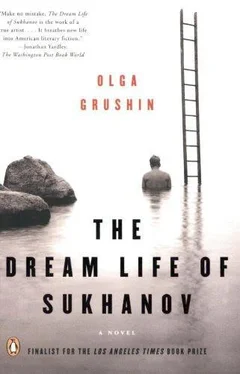“Yes,” I said, kissing her lightly. “A very long time. I’m sorry too. But everything will be different now, you’ll see.”
And then the sunrise of December first was upon us.
When I left the house that morning, I did not go directly to the Manège. Perhaps I feared the disappointment of seeing indifferent crowds stroll with scarcely a glance past my work; or maybe I simply wanted to prolong the anticipation, sensing it to be immensely richer than the most resounding acclaim could ever be. The bleak day smelled of winter, the sky and the houses were the running gray and yellow of a spare watercolor, and rare pedestrians glided through the pale landscapes in silent, chilled preoccupation, leaving behind black garlands of footprints filled with the glistening slush of yesterday’s melting snow. Wandering along the wet pavements in their wake, I did not think of the exhibition that at this very moment, perhaps, was opening its doors to eager visitors only a few streets and squares away; but a deep happiness, a kind of muted, exultant hum, underlay all my steps, all my breaths, all my heartbeats, infusing my walk with a triumphant spring and my soul with a glow of well-being.
And by the time I turned a random corner and unexpectedly saw the Manège rise into view, I had understood, with an effortless, wordless certainty, that I was finally ready to undertake my most ambitious project yet—a challenge I had cherished secretly for many years—a series of seven paintings that would merge everything I felt about Russia, and history, and art, and God.
Already impatient to return home and begin to sketch, I started toward the Manège. The sky was low before another snowfall, and the ancient towers of the Kremlin squatted morosely under the sagging clouds. Although there were more people here, it was suddenly so quiet I could hear the echoing steps of a man running along the street, heedlessly dogged by his own frantic shadow. I felt that my vision had never been sharper, as if all my artistic powers had been released at once. Happiness soared inside me like a mad angel. The first painting, I already knew, would be called The Garden of Eden, and its predominant color would be green—the lush, sunny green at the heart of a birch forest, the subtler, mysterious green of Nina’s eyes, the simple, joyful green of the carpet I had played on as a child…. A snowflake pricked the skin of my hand; the running man was closer; I could see he had no hat on. At the opposite end of the spectrum, on the other side of the gates of paradise, would be the dull green of a chain-link fence, the poisonous green of a neon sign, the oppressive green of hospital walls, the… the… The running man was upon me now. His face was distorted, his eyes wild. It was Lev Belkin.
“It’s over,” he gasped. “Where have you been? It’s all over.”
“What is it? What’s the matter?” I said, laughing as I arrested his flight, already anticipating some impish joke.
He shook himself free of my arms.
“Khrushchev and some bigwigs… showed up at the Manège this morning,” he said between rasping breaths. “An official visit… we weren’t told about. It was… I can’t tell you what it was like. Where the hell have you been?”
It was not a joke after all. He sounded furious and, underneath it, frightened.
“I was just walking around,” I said quickly. “What happened?”
“I’ll tell you what happened.” He kept glancing over his shoulder as if worried he was being chased. “Khrushchev hated everything he saw. Abstract paintings in particular, but the rest as well. He went all red in the face and shouted that our works were good only for covering urinals, and other things too—terrible things…. Real art should ennoble the individual and arouse him to action, these kinds of pictures are amoral and anti-Soviet, they have wasted money on us, we should be sent far away and put to work cutting trees so we could pay back the state for all the paper we’ve besmirched—”
“Did he… did he say anything about my painting?” I asked haltingly.
Lev grabbed my coat, so violently that I felt something rip. For a second I thought he was going to hit me. Then, slowly, his mouth softened.
“ Your painting?” he said, releasing me. “Tolya, are you listening? Who cares what he thought about your painting? I’m sure he didn’t notice it—he didn’t really look at any of our things. He just saw something different and charged like a bull at a red cape. Roshchin thinks the whole affair was a provocation—that bastard from the Ministry who invited us to the show must have known about the state visit all along, and hoped that Khrushchev would have precisely this reaction. God, Tolya, don’t you understand? We are finished, we are all finished! They are declaring war on us—prison camps and all the rest!”
For some time I studied an object lying on Lev’s open palm. It was round and black and shiny, and had four small holes in it; a frayed bit of thread was sticking out of a lower hole. It looked odd, like some puzzling artifact of an ancient, forgotten civilization. Then, through the resounding silence in my mind, one thought emerged: Nina.
“Nina is coming to the Manège at two o‘clock,” I said dully. “I was going to show her around. I’d like her to see my painting hanging on the wall at least once. It’s a painting of her, and she would really—”
Lev looked away.
“They are taking everything down as we speak,” he said slowly. “Nina knows already, I called her. I’ve been looking for you for over an hour.” After a small pause, he added, “Sorry about your coat”—and pressed the torn-off button into my hand.
The days that followed were a wretched blur. There were the rooms at the Manège, the walls bare now, with a draft off the street tossing homeless shreds of wrapping paper from corner to corner and a few square-shouldered, square-faced young men in freshly pressed suits shrugging noncommittally when a frantic, disheveled Roshchin begged them to disclose the fate of our works. There were the hours at the institute when Lev and I struggled through our meaningless lectures while the whispers of the Manège affair spread behind our backs, and that splendidly sunny morning when Leonid Penkin pushed his corpulent belly through my door and in a bored drawl relieved me of my position. There was the miserable evening I spent at Lev’s place, with Lev, also fired, sitting stony-faced at the kitchen table, pouring himself glass after glass of vodka, while Alla shrilly lamented her wasted youth. Worse yet, there was the silent disapproval in my own home, with the television loudly reciting victories of socialist labor behind my mother’s closed door and Nina moving about the kitchen like the ghost of a housewife doomed for all eternity to miming a multitude of imaginary chores, too busy to talk, avoiding my eyes, as if she blamed me for what had happened—but mainly, through it all, behind it all, there was an emptiness, a vast, cold, ever-present, all-pervasive emptiness inside me that kept me awake for hours every night, without thoughts, without hopes, trapped in a heavy darkness alone with the barely visible shadows of my paintings, now damned forever.
As the week neared its end, our worst fears, at least, had not been realized—though a few of us had lost our jobs, and the rest had received official reprimands, no one had been arrested, and even Roshchin, who had vanished mysteriously the day after the fateful opening, prompting his distraught mistress to make incoherent, sobbing calls to all his friends, turned up the next morning, with a black eye and reeking of drink but otherwise unharmed. Yet the sense of impending disaster continued to oppress us, and Lev kept nervously proposing extended trips to the country. “The thing to do right now,” he repeated, “is to lie low until they forget about us.” I would merely shrug in response. As time dragged on, irresolute and despondent, I found myself increasingly indifferent to my ultimate fate, and felt a listless calm when the telephone screamed at four in the morning on two consecutive nights and then hummed with pregnant silence into my ear, or when one evening, just as my mother and I were sitting down to supper (Nina was in bed with a migraine), there sounded a harsh knock on the door and I discovered a strange man on the landing, wearing a glossy beaver hat down to his eyebrows and carrying a bunch of artificial carnations (the kind one places on graves), who, proclaiming with a sinister smile that he must have mistaken the door, persisted in peering over my shoulder into our apartment. Nina did not share my detachment. After the man’s appearance on our doorstep, she grew tense whenever she heard steps on our floor and disliked answering the telephone; and thus it was I who lifted the receiver when, exactly one week after the catastrophe, my father-in-law rang our place.
Читать дальше








![Theresa Cheung - The Dream Dictionary from A to Z [Revised edition] - The Ultimate A–Z to Interpret the Secrets of Your Dreams](/books/692092/theresa-cheung-the-dream-dictionary-from-a-to-z-r-thumb.webp)



